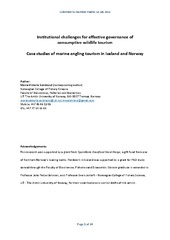Regional governance change in Northern Norway. Insights for Northern Ontario, Canada
Permanent lenke
https://hdl.handle.net/10037/18855Dato
2020-06-02Type
Master thesisMastergradsoppgave
Forfatter
Everett, EricSammendrag
Northern Ontario has been inadequately governed, perpetuating chronic health, social and economic issues. Recent policy discourse has suggested that the region take more control through the development of new regional governance or governments. The region should also look to other Northern jurisdictions for ideas.
This comparative case study examined the state of regional governance in two Northern regions, comparing the calls for regional governance change to more effectively administer Northwestern Ontario (as a part of Northern Ontario) against the Norwegian state-mandated amalgamation of Troms and Finnmark Counties (as part of Northern Norway). Six public officials– elected officials (politicians) or public servants (bureaucrats)– were interviewed in Northwestern Ontario and four were interviewed in the former Troms and Finnmark Counties.
Informants in both countries validated the concept of Northern alienation and generally agreed that better regional governance and less central control was needed. Important considerations from Norway experience’s could inform Northern Ontario should it embark on regional governance change, including: consider a collaborative approach rather than a top-down, forced amalgamation; avoid determining the “form before function”; consider a “place-based” approach; consider regional rivalries and the impact of “re-centralization” to new capitals; include an external perspective; and involve Indigenous people from the beginning.
Finally, in both Northern Norway and Northern Ontario, the most important overarching observation may be that public and Indigenous governance remains on separate tracks. This is of greater concern to Northern Ontario, where public regional governance appears to be stagnant while Indigenous governance continues to evolve.
Forlag
UiT Norges arktiske universitetUiT The Arctic University of Norway
Metadata
Vis full innførsel
Copyright 2020 The Author(s)
Følgende lisensfil er knyttet til denne innførselen:
Med mindre det står noe annet, er denne innførselens lisens beskrevet som Attribution-NonCommercial-ShareAlike 4.0 International (CC BY-NC-SA 4.0)
Relaterte innførsler
Viser innførsler relatert til tittel, forfatter og emneord.
-
Marine tourism fisheries - Challenges of governance and governability Northern Norway as a case study
Solstrand, Maria-Victoria (Doctoral thesis; Doktorgradsavhandling, 2014-12-17)The research focus for this dissertation is marine tourism fisheries – a sector rapidly growing in popularity in Northern Norway. Data from this research study suggest that the ecological impacts may be more significant than previously thought. As such, it is suggested that marine tourism fisheries be considered separately from recreational fishing, and alongside commercial-scale and small-scale ... -
Between koranic school and the government school system : the case of the Fulbe of Mayo-Darle, Northern Cameroon
Gougoure, Hireine (Master thesis; Mastergradsoppgave, 2009-05-29)This thesis is about the way the Fulbe of Mayo-Darle relate to the question of education, be it formal or informal, the Koranic or the governmental. As Muslim, Fulbe people send their children to Koranic School so they can acquire religious knowledge and also their traditional knowledge which enable them to integrate their community. But in Cameroon nowadays, the governmental education is deemed ... -
The Polar Silk Road and the future governance of the Northern Sea Route
Liu, Nengye; Solski, Jan Jakub (Journal article; Tidsskriftartikkel; Peer reviewed, 2022-09-05)This article examines China’s Polar Silk Road (PSR) and its legal implications for the future governance of the Northern Sea Route (NSR). It first discusses China’s economic and geopolitical interests in the so-called Polar Silk Road. The article then focuses on comparing Russian regulation of the NSR and Chinese regulation of foreign vessels as a coastal state. Both China and Russia are contracting ...


 English
English norsk
norsk



